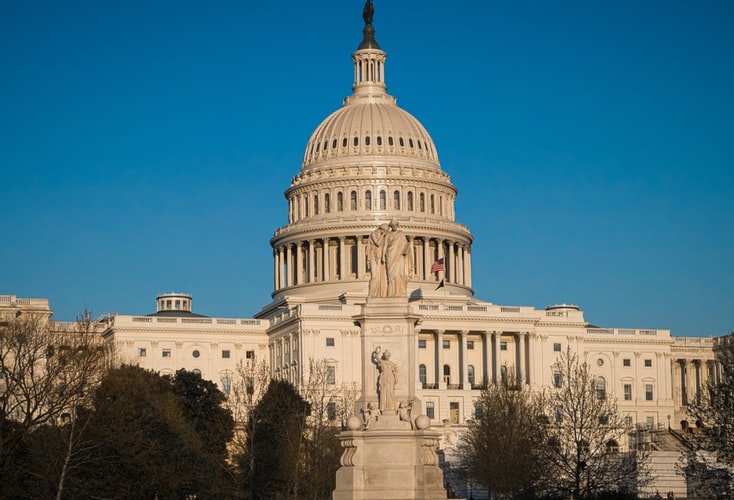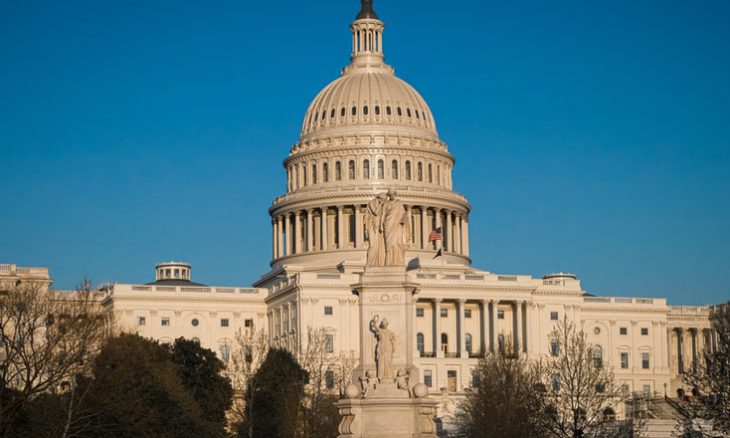The Legislative Branch

Article I of the U.S. Constitution establishes Congress as the body with all legislative powers, established across two chambers: the House of Representatives and the Senate. House members serve two-year terms, while members of the Senate serve terms of six years. Congress is the body that creates laws, and both chambers must agree before a legislative matter can go to the president for a signature where it becomes the law of the land.
Congress has the power to make laws, declare war, raise and provide public money and oversee its proper expenditure, impeach any federal officer, approve presidential appointments, approve treaties negotiated by the executive branch, and conduct oversight and investigations.
The Congress as we know it today was created after the failure of a government under the Articles of Confederation, which left most powers to the states.
For more than two centuries, a new Congress has convened every two years following elections that determine all the seats in the House and one-third of those in the Senate. From the beginning, the two chambers of Congress were meant to be different, yet interdependent. Founder James Madison said they would be “as little connected with each other, as the nature of their common functions and their common dependence on society, will admit.” As a result, both chambers have different rules, functions, traditions, and culture. Still, in their shared responsibilities, they function as the nation’s single law-making body.
In the current 117th Congress, Nancy Pelosi of California is the Speaker of the House of Representatives. The first Speaker was Frederick A.C. Mullenberg of Pennsylvania, who served two non-consecutive terms as Speaker. The vice president of the United States serves as the presiding officer of the Senate, and the first Senate had John Adams of Massachusetts in that position. Party leadership emerged in the late 19th and early 20th centuries when both party conferences in the Senate elected leaders to speak for their members, coordinate action on the Senate floor, and work with the executive branch on policy priorities when in the same party as the president. Today’s Senate Majority Leader is Charles E. Schumer of New York and the Minority Leader is A. Mitchell McConnell, III, of Kentucky.
A new Congress is established every two years, with “midterm” elections occurring halfway between presidential elections when every House seat and one-third of seat sets are chosen. At this time, primary elections either have been or are still being held to select the candidates for those positions for the general election that will be held on November 8.
There have been numerous “October surprises” throughout the history of the United States as it relates to elections. Whether or not this year’s midterm elections, which are 77 days away, could be upended by a dominant event is yet to be determined.
One thing is certain. Voters in 2022 are not happy. According to a New York Times article, just 13 percent of registered voters said America is heading in the right direction. Only 20 percent said the economy was excellent or good. And a majority of voters said the nation was too politically divided to solve its challenges. By comparison, those numbers show a more pessimistic electorate than in October 2020, when the pandemic was raging, and Donald Trump was running for reelection against Joe Biden.
As short a time ago as mid-June 2022, inflation, extremism, and gun violence were national top worries. Since then, the Supreme Court issued its ruling returning abortion decisions to the states, the inflation has shown two negative growth quarters meaning it is technically a recession, the Federal Reserve has increased borrowing rates, and the FBI has conducted a pre-dawn raid on President Trump’s residence in Florida. It is not at all implausible that something more could take place that would change the minds of voters, one way or the other.
God’s Word reminds you to pray for your leaders (1 Timothy 2:1-2), and of the responsibility of good leaders (Titus 1:7-14). It also cautions the electorate, you the voter, to choose wisely who will serve them in positions of leadership. “When the righteous increase, the people rejoice; but when the wicked rule, the people groan” (Proverbs 29:2).
How then should we pray?
- For the current members of the House and Senate as they craft and pass legislation that will have a long-term impact on the nation’s growth and security.
- For voters in the midterm elections to be wise in their determinations.
- For Christian voters to seek the Lord in everything, and be ready to uphold Biblical values in their voting selections.
- For a new Congress to consist of many more righteous and godly men and women whose desire it is to see America flourish as One Nation Under God.





